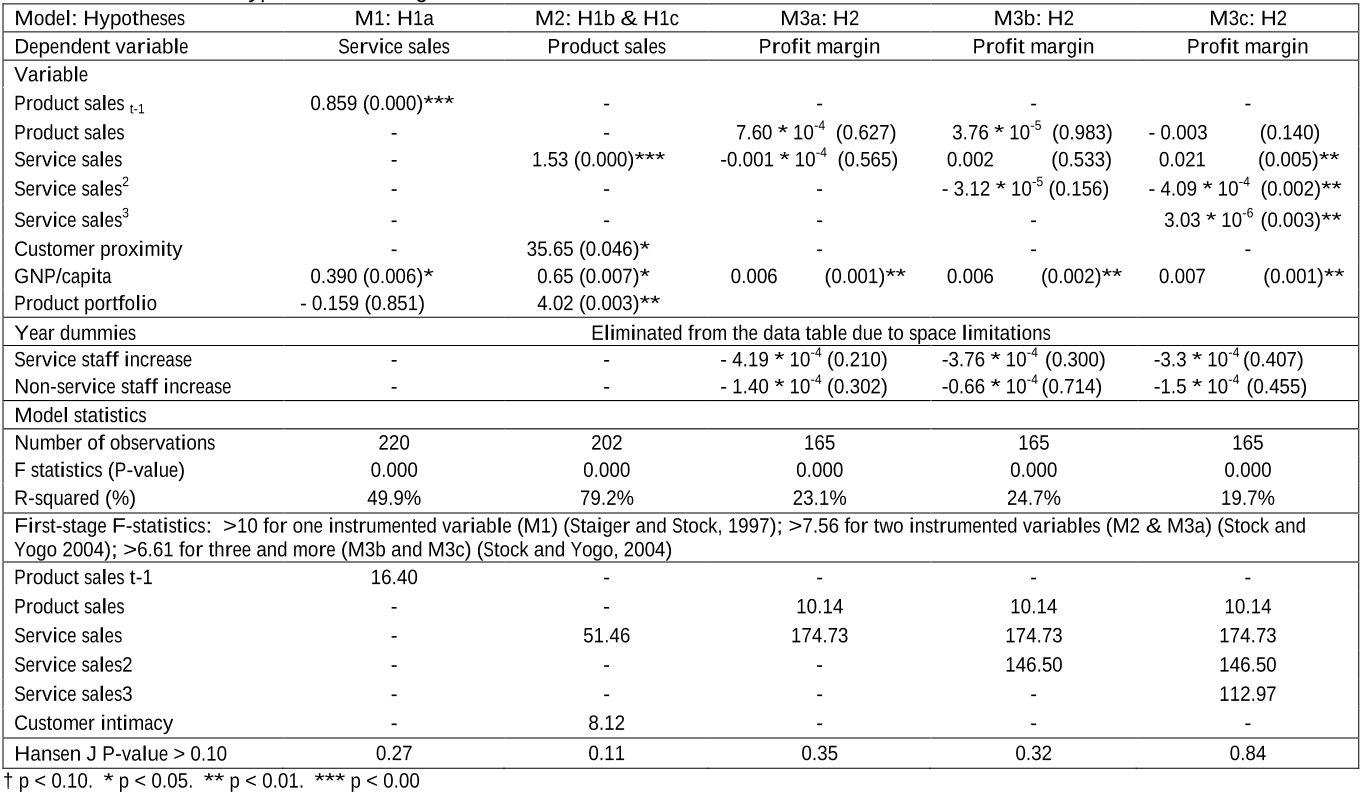Servitization: Disentangling the impact of service business model innovation on manufacturing firm performance
TLDR
In this paper, the authors analyzed the value creation and value appropriation processes of 44 national subsidiaries of a global manufacturing firm turned product-service provider, in the 2001-2007 period, and found that the firm under study is able to successfully transcend the inherent substitution of products by services and to enact complementary sales dynamics between the two activities.About:
This article is published in Journal of Operations Management.The article was published on 2013-05-01 and is currently open access. It has received 584 citations till now. The article focuses on the topics: Service (business) & Profitability index.read more
Figures

Table 3. Results from Hypotheses Testing 
Figure 1. Relationship between service scale and subsidiary profit margin* 
Table 1.a Overview of the variables and their use 
Table 1.a Overview of the variables and their use 
Table 2. Summary statistics and correlation coefficient No Variable Obs Mean SD Min Max 1 2 3 4 5 6 7 8 9 10 11 12 13 14
Citations
More filters
Journal ArticleDOI
Servitization and organizational resilience of manufacturing firms: Evidence from the COVID-19 outbreak
TL;DR: In this paper , the authors examined how service-oriented business model diversification of manufacturing firms (i.e., servitization) has affected their organizational resilience during the COVID-19 outbreak.
Journal ArticleDOI
A pricing model for Internet of Things-based fleet services to support equipment sales
TL;DR: An analytical model is presented for studying the development costs and pricing of new Internet of Things-based services for especially populations, or fleets, of industrial production equipment and machines and suggests the optimal price of a fleet service as a function of the life cycle of the service.
Investigating a servicisation model for the use and instillation of solar water heaters in Cape Town, South Africa
TL;DR: In this paper, the authors investigated whether servicisation within a housing estate could be favourably received by residents in this high-income bracket, who were more willing to invest their own capital in renewables rather than being provided with a solar water heater through servicisation.
Posted ContentDOI
A Conceptual Model for Product Service System (PSS)
TL;DR: In this article, a Conceptual Model (PSS-CM) is proposed to support the early stages of Product Service System (PSs) development and support the sustainable development of its main outcome, which is required not only to have a clear and common understanding of the core business and processes but also to share the same definitions on PSS concepts.
Book ChapterDOI
A Conceptual Guideline to Support Servitization Strategy Through Individual Actions
TL;DR: In this article, the authors provide a conceptual guideline that supports firms and practitioners to understand the change management aspects of servitization, which is based on conceptual literature, combined with empirical data from a major study.
References
More filters
Book ChapterDOI
Firm Resources and Sustained Competitive Advantage
TL;DR: In this article, the authors examined the link between firm resources and sustained competitive advantage and analyzed the potential of several firm resources for generating sustained competitive advantages, including value, rareness, imitability, and substitutability.
Book
Econometric Analysis of Cross Section and Panel Data
TL;DR: This is the essential companion to Jeffrey Wooldridge's widely-used graduate text Econometric Analysis of Cross Section and Panel Data (MIT Press, 2001).
Journal ArticleDOI
Dynamic capabilities and strategic management
TL;DR: The dynamic capabilities framework as mentioned in this paper analyzes the sources and methods of wealth creation and capture by private enterprise firms operating in environments of rapid technological change, and suggests that private wealth creation in regimes of rapid technology change depends in large measure on honing intemal technological, organizational, and managerial processes inside the firm.
Journal ArticleDOI
Some Tests of Specification for Panel Data: Monte Carlo Evidence and an Application to Employment Equations.
Manuel Arellano,Stephen Bond +1 more
TL;DR: In this article, the generalized method of moments (GMM) estimator optimally exploits all the linear moment restrictions that follow from the assumption of no serial correlation in the errors, in an equation which contains individual effects, lagged dependent variables and no strictly exogenous variables.
Related Papers (5)
Exploring the financial consequences of the servitization of manufacturing
Andy Neely,Andy Neely +1 more